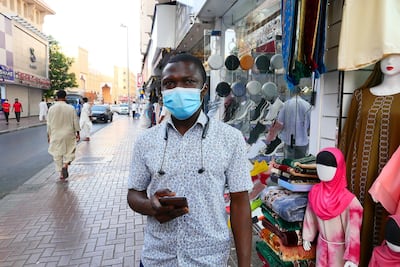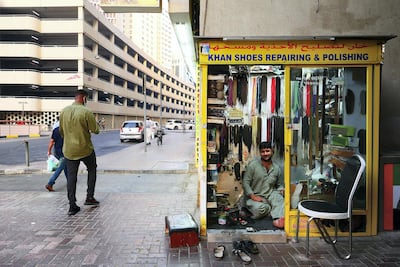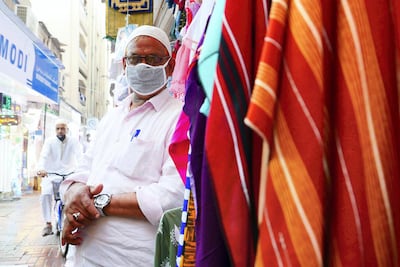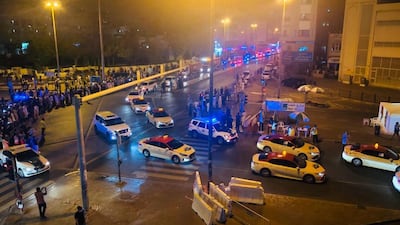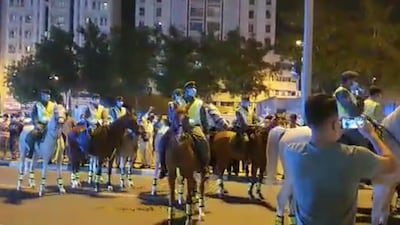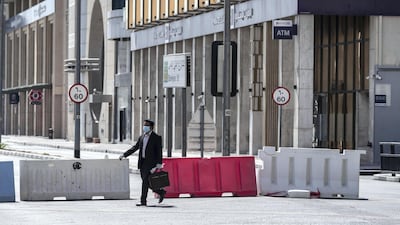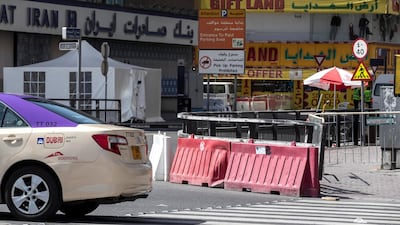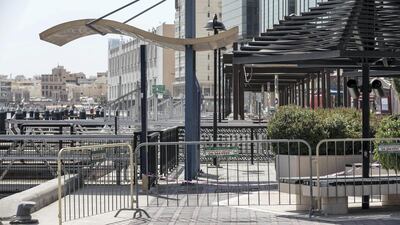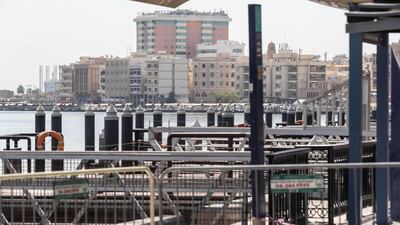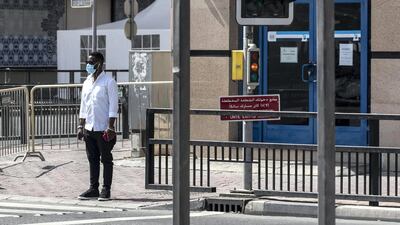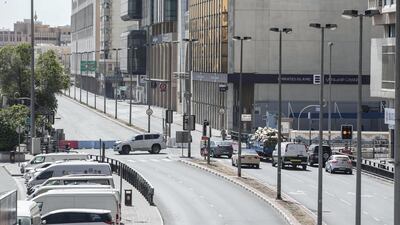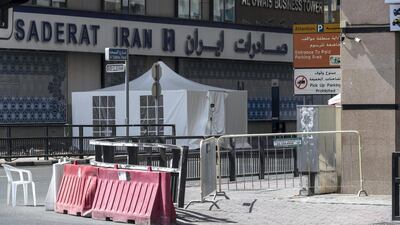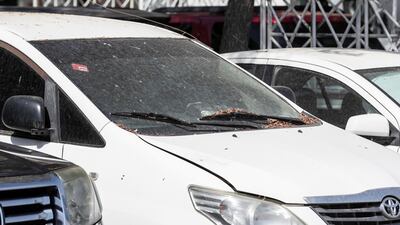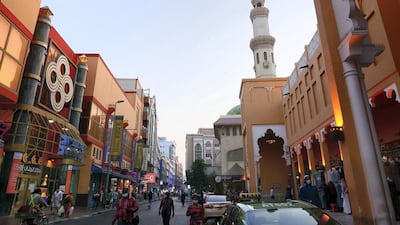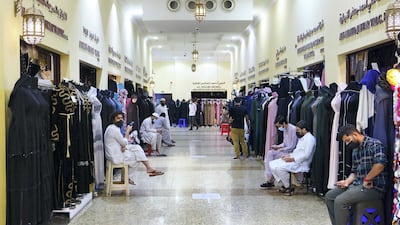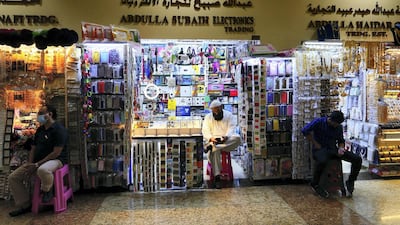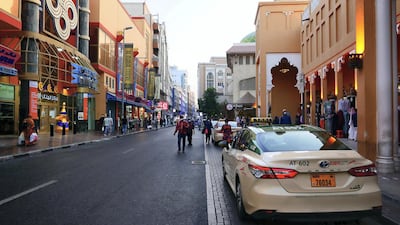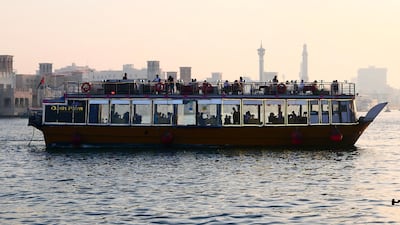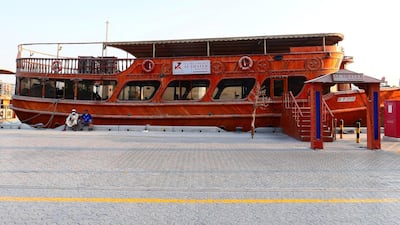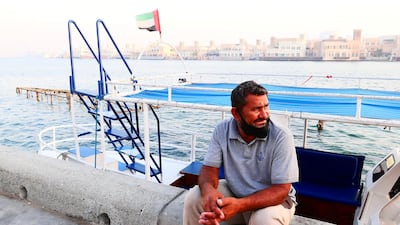One year ago, Fawaz Bello was confined to his small apartment in Naif as authorities carried out a mass Covid-19 testing and cleaning drive in one of Dubai's oldest districts.
The densely populated area was put under a strict four-week-long lockdown from March 31 to April 26 to curb the spread of the virus.
Today, almost a year after since the 24-hour movement restrictions were lifted, Mr Bello can reflect on the challenges faced by the neighbourhood and look forward to better times.
Mr Bello, 37, was among thousands who were affected by the lockdown in Naif and the adjacent Al Ras.
“Last year, it was very tough,” said Mr Bello, from Nigeria.
“We couldn’t go out but for good reasons so authorities could sanitise the area and test everyone.”
The National visited Naif to see how businesses and residents were faring.
Life is getting back to normal
Before the pandemic struck, tourists flocked to the neighbourhood for a flavour of old Dubai and to haggle for a bargain in the many shops which provide its unique character.
In the Covid-19 age, as with much of the rest of the world, the scene is more muted with the narrow streets of Naif now populated mostly by its residents.
“There are a lot of businesses here that have closed down and there aren’t as many tourists as there used to be,” said Mr Bello, who lives and works in the area, earning Dh3,000 per month at a logistics firm.
“But the situation is still better now as compared to how it was one year ago when the lockdown was in place.
“Back then, I had to use my savings to send my family back home money because I wasn’t being paid on time. I spent a lot of time reading the Quran because it was also Ramadan during the lockdown, which was one of the good things for me.
“Now, I feel like life is 60 per cent back to normal for me. I am able to go out and move around freely. We are much safer here as compared to some other parts of the world during these tough times.”
Some business owners who spoke to The National said the return of more tourists in the area would help boost sales, while others that have been in the district for decades said they were "comfortable in the current situation".
Shop owner thankful for loyal customers
Amanullah Khan runs a small shoe repairing shop that has been operating in Dubai since 1971.
His father moved from Pakistan to the UAE decades ago to start the business, which Mr Khan said was thriving before the Coronavirus outbreak, but is still “doing well” at the moment.
“Last year, there was obviously no business. Everything was closed,” he said.
“But, now, things are slowly starting to get better. Our business has a good reputation and we have a lot of loyal customers who live in the neighbourhood.”
Mohammed Akram, 47, owns a small boat, which he uses to offer customers a sightseeing trip.
“I bought this boat four months before the virus hit,” he said. “Then, when we heard the lockdown was about to happen, I was able to get a flight back to Pakistan just a day before everything closed.”
Mr Akram said he earned Dh9,000 in the first four months of business, but business has slowed of late.
Traders optimistic for future
Moidu Parlot, 58, opened his shop in Naif only four months ago, but has lived there for several years and currently shares a one-bedroom apartment with seven people.
“I was working as a warehouse manager before, but was fired after the virus started. I was in India when the lockdown here happened,” he said.
“I opened this shop a few months ago. Business will be better when tourists start coming again, but, for now, we have to hope a lot of residents here would help increase our sales.”
Across the road from streets packed with hundreds of shops, there is a waterway where large dhow and small abra owners operate their businesses.
While some dhow owners are doing well after introducing attractive deals on dinner cruises, others, including small boat operators, are waiting for business to pick up.
Life in lockdown in Naif and Al Ras in 2020:
Tips to avoid getting scammed
1) Beware of cheques presented late on Thursday
2) Visit an RTA centre to change registration only after receiving payment
3) Be aware of people asking to test drive the car alone
4) Try not to close the sale at night
5) Don't be rushed into a sale
6) Call 901 if you see any suspicious behaviour
Moon Music
Artist: Coldplay
Label: Parlophone/Atlantic
Number of tracks: 10
Rating: 3/5
Our legal consultant
Name: Dr Hassan Mohsen Elhais
Position: legal consultant with Al Rowaad Advocates and Legal Consultants.
What is an ETF?
An exchange traded fund is a type of investment fund that can be traded quickly and easily, just like stocks and shares. They come with no upfront costs aside from your brokerage's dealing charges and annual fees, which are far lower than on traditional mutual investment funds. Charges are as low as 0.03 per cent on one of the very cheapest (and most popular), Vanguard S&P 500 ETF, with the maximum around 0.75 per cent.
There is no fund manager deciding which stocks and other assets to invest in, instead they passively track their chosen index, country, region or commodity, regardless of whether it goes up or down.
The first ETF was launched as recently as 1993, but the sector boasted $5.78 billion in assets under management at the end of September as inflows hit record highs, according to the latest figures from ETFGI, a leading independent research and consultancy firm.
There are thousands to choose from, with the five largest providers BlackRock’s iShares, Vanguard, State Street Global Advisers, Deutsche Bank X-trackers and Invesco PowerShares.
While the best-known track major indices such as MSCI World, the S&P 500 and FTSE 100, you can also invest in specific countries or regions, large, medium or small companies, government bonds, gold, crude oil, cocoa, water, carbon, cattle, corn futures, currency shifts or even a stock market crash.
Overall standings
1. Christopher Froome (GBR/Sky) 68hr 18min 36sec,
2. Fabio Aru (ITA/AST) at 0:18.
3. Romain Bardet (FRA/ALM) 0:23.
4. Rigoberto Uran (COL/CAN) 0:29.
5. Mikel Landa (ESP/SKY) 1:17.
MATCH INFO
Uefa Champions League semi-final, first leg
Tottenham v Ajax, Tuesday, 11pm (UAE).
Second leg
Ajax v Tottenham, Wednesday, May 8, 11pm
Games on BeIN Sports
AndhaDhun
Director: Sriram Raghavan
Producer: Matchbox Pictures, Viacom18
Cast: Ayushmann Khurrana, Tabu, Radhika Apte, Anil Dhawan
Rating: 3.5/5
Film: In Syria
Dir: Philippe Van Leeuw
Starring: Hiam Abbass, Diamand Bo Abboud, Mohsen Abbas and Juliette Navis
Verdict: Four stars
Results
Ashraf Ghani 50.64 per cent
Abdullah Abdullah 39.52 per cent
Gulbuddin Hekmatyar 3.85 per cent
Rahmatullah Nabil 1.8 per cent
List of officials:
Referees: Chris Broad, David Boon, Jeff Crowe, Andy Pycroft, Ranjan Madugalle and Richie Richardson.
Umpires: Aleem Dar, Kumara Dharmasena, Marais Erasmus, Chris Gaffaney, Ian Gould, Richard Illingworth, Richard Kettleborough, Nigel Llong, Bruce Oxenford, Ruchira Palliyaguruge, Sundaram Ravi, Paul Reiffel, Rod Tucker, Michael Gough, Joel Wilson and Paul Wilson.
Groom and Two Brides
Director: Elie Semaan
Starring: Abdullah Boushehri, Laila Abdallah, Lulwa Almulla
Rating: 3/5
UAE currency: the story behind the money in your pockets
UAE currency: the story behind the money in your pockets
COMPANY%20PROFILE
%3Cp%3E%3Cstrong%3ECompany%20name%3A%3C%2Fstrong%3E%20Sav%3Cbr%3E%3Cstrong%3EStarted%3A%3C%2Fstrong%3E%202021%3Cbr%3E%3Cstrong%3EFounder%3A%3C%2Fstrong%3E%20Purvi%20Munot%3Cbr%3E%3Cstrong%3EBased%3A%3C%2Fstrong%3E%20Dubai%3Cbr%3E%3Cstrong%3EIndustry%3A%3C%2Fstrong%3E%20FinTech%3Cbr%3E%3Cstrong%3EFunding%3A%3C%2Fstrong%3E%20%24750%2C000%20as%20of%20March%202023%3Cbr%3E%3Cstrong%3EInvestors%3A%3C%2Fstrong%3E%20Angel%20investors%3C%2Fp%3E%0A
Scoreline
Saudi Arabia 1-0 Japan
Saudi Arabia Al Muwallad 63’
How to avoid crypto fraud
- Use unique usernames and passwords while enabling multi-factor authentication.
- Use an offline private key, a physical device that requires manual activation, whenever you access your wallet.
- Avoid suspicious social media ads promoting fraudulent schemes.
- Only invest in crypto projects that you fully understand.
- Critically assess whether a project’s promises or returns seem too good to be true.
- Only use reputable platforms that have a track record of strong regulatory compliance.
- Store funds in hardware wallets as opposed to online exchanges.
Tamkeen's offering
- Option 1: 70% in year 1, 50% in year 2, 30% in year 3
- Option 2: 50% across three years
- Option 3: 30% across five years
pakistan Test squad
Azhar Ali (capt), Shan Masood, Abid Ali, Imam-ul-Haq, Asad Shafiq, Babar Azam, Fawad Alam, Haris Sohail, Imran Khan, Kashif Bhatti, Mohammad Rizwan (wk), Naseem Shah, Shaheen Shah Afridi, Mohammad Abbas, Yasir Shah, Usman Shinwari
Paatal Lok season two
Directors: Avinash Arun, Prosit Roy
Stars: Jaideep Ahlawat, Ishwak Singh, Lc Sekhose, Merenla Imsong
Rating: 4.5/5
Game Changer
Director: Shankar
Stars: Ram Charan, Kiara Advani, Anjali, S J Suryah, Jayaram
Rating: 2/5
MATCH INFO
Uefa Champions League, last 16, first leg
Tottenham Hotspur v Borussia Dortmund, midnight (Thursday), BeIN Sports
COMPANY%20PROFILE
%3Cp%3E%3Cstrong%3EName%3A%20%3C%2Fstrong%3EEjari%3Cbr%3E%3Cstrong%3EBased%3A%20%3C%2Fstrong%3ERiyadh%2C%20Saudi%20Arabia%3Cbr%3E%3Cstrong%3EFounders%3A%20%3C%2Fstrong%3EYazeed%20Al%20Shamsi%2C%20Fahad%20Albedah%2C%20Mohammed%20Alkhelewy%20and%20Khalid%20Almunif%3Cbr%3E%3Cstrong%3ESector%3A%20%3C%2Fstrong%3EPropTech%3Cbr%3E%3Cstrong%3ETotal%20funding%3A%20%3C%2Fstrong%3E%241%20million%3Cbr%3E%3Cstrong%3EInvestors%3A%20%3C%2Fstrong%3ESanabil%20500%20Mena%2C%20Hambro%20Perks'%20Oryx%20Fund%20and%20angel%20investors%3Cbr%3E%3Cstrong%3ENumber%20of%20employees%3A%20%3C%2Fstrong%3E8%3C%2Fp%3E%0A
Fight card
1. Bantamweight: Victor Nunes (BRA) v Siyovush Gulmamadov (TJK)
2. Featherweight: Hussein Salim (IRQ) v Shakhriyor Juraev (UZB)
3. Catchweight 80kg: Rashed Dawood (UAE) v Khamza Yamadaev (RUS)
4. Lightweight: Ho Taek-oh (KOR) v Ronald Girones (CUB)
5. Lightweight: Arthur Zaynukov (RUS) v Damien Lapilus (FRA)
6. Bantamweight: Vinicius de Oliveira (BRA) v Furkatbek Yokubov (RUS)
7. Featherweight: Movlid Khaybulaev (RUS) v Zaka Fatullazade (AZE)
8. Flyweight: Shannon Ross (TUR) v Donovon Freelow (USA)
9. Lightweight: Mohammad Yahya (UAE) v Dan Collins (GBR)
10. Catchweight 73kg: Islam Mamedov (RUS) v Martun Mezhulmyan (ARM)
11. Bantamweight World title: Jaures Dea (CAM) v Xavier Alaoui (MAR)
12. Flyweight World title: Manon Fiorot (FRA) v Gabriela Campo (ARG)
THE SPECS
Engine: 1.5-litre
Transmission: 6-speed automatic
Power: 110 horsepower
Torque: 147Nm
Price: From Dh59,700
On sale: now
STAY%2C%20DAUGHTER
%3Cp%3E%3Cstrong%3EAuthor%3A%20%3C%2Fstrong%3EYasmin%20Azad%3C%2Fp%3E%0A%3Cp%3E%3Cstrong%3EPublisher%3A%20%3C%2Fstrong%3ESwift%20Press%3C%2Fp%3E%0A%3Cp%3E%3Cstrong%3EAvailable%3A%20%3C%2Fstrong%3ENow%3C%2Fp%3E%0A
More coverage from the Future Forum
Why it pays to compare
A comparison of sending Dh20,000 from the UAE using two different routes at the same time - the first direct from a UAE bank to a bank in Germany, and the second from the same UAE bank via an online platform to Germany - found key differences in cost and speed. The transfers were both initiated on January 30.
Route 1: bank transfer
The UAE bank charged Dh152.25 for the Dh20,000 transfer. On top of that, their exchange rate margin added a difference of around Dh415, compared with the mid-market rate.
Total cost: Dh567.25 - around 2.9 per cent of the total amount
Total received: €4,670.30
Route 2: online platform
The UAE bank’s charge for sending Dh20,000 to a UK dirham-denominated account was Dh2.10. The exchange rate margin cost was Dh60, plus a Dh12 fee.
Total cost: Dh74.10, around 0.4 per cent of the transaction
Total received: €4,756
The UAE bank transfer was far quicker – around two to three working days, while the online platform took around four to five days, but was considerably cheaper. In the online platform transfer, the funds were also exposed to currency risk during the period it took for them to arrive.
Lowest Test scores
26 - New Zealand v England at Auckland, March 1955
30 - South Africa v England at Port Elizabeth, Feb 1896
30 - South Africa v England at Birmingham, June 1924
35 - South Africa v England at Cape Town, April 1899
36 - South Africa v Australia at Melbourne, Feb. 1932
36 - Australia v England at Birmingham, May 1902
36 - India v Australia at Adelaide, Dec. 2020
38 - Ireland v England at Lord's, July 2019
42 - New Zealand v Australia in Wellington, March 1946
42 - Australia v England in Sydney, Feb. 1888
Glossary of a stock market revolution
Reddit
A discussion website
Redditor
The users of Reddit
Robinhood
A smartphone app for buying and selling shares
Short seller
Selling a stock today in the belief its price will fall in the future
Short squeeze
Traders forced to buy a stock they are shorting
Naked short
An illegal practice
Teams
Punjabi Legends Owners: Inzamam-ul-Haq and Intizar-ul-Haq; Key player: Misbah-ul-Haq
Pakhtoons Owners: Habib Khan and Tajuddin Khan; Key player: Shahid Afridi
Maratha Arabians Owners: Sohail Khan, Ali Tumbi, Parvez Khan; Key player: Virender Sehwag
Bangla Tigers Owners: Shirajuddin Alam, Yasin Choudhary, Neelesh Bhatnager, Anis and Rizwan Sajan; Key player: TBC
Colombo Lions Owners: Sri Lanka Cricket; Key player: TBC
Kerala Kings Owners: Hussain Adam Ali and Shafi Ul Mulk; Key player: Eoin Morgan
Venue Sharjah Cricket Stadium
Format 10 overs per side, matches last for 90 minutes
Timeline October 25: Around 120 players to be entered into a draft, to be held in Dubai; December 21: Matches start; December 24: Finals
ICC T20 Team of 2021
Jos Buttler, Mohammad Rizwan, Babar Azam, Aiden Markram, Mitchell Marsh, David Miller, Tabraiz Shamsi, Josh Hazlewood, Wanindu Hasaranga, Mustafizur Rahman, Shaheen Afridi
